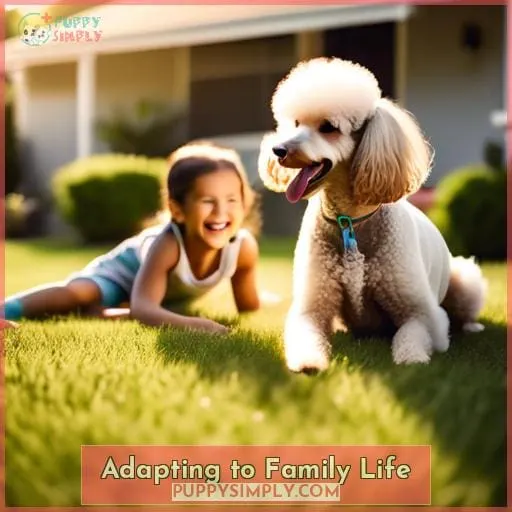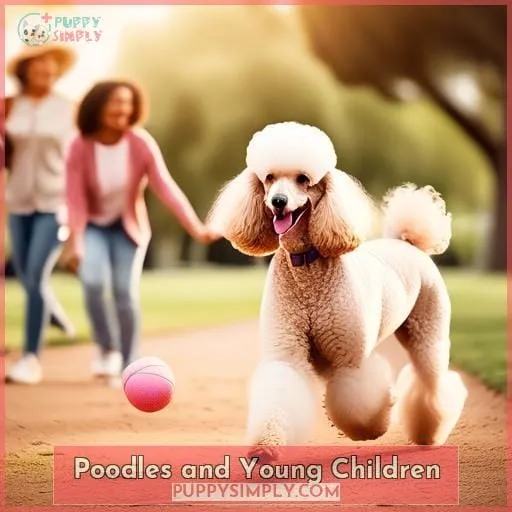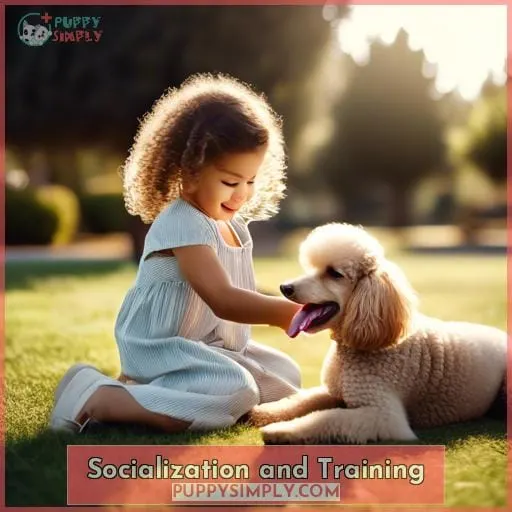This site is supported by our readers. We may earn a commission, at no cost to you, if you purchase through links.
 Nearly 70% of U.S. households own a pet, with dogs being the most popular choice.
Nearly 70% of U.S. households own a pet, with dogs being the most popular choice.
As you consider adding a furry member to your family, you might wonder, are poodles good with kids?
Renowned for their intelligence and affectionate nature, poodles can be excellent companions for children, offering loyalty and joy to your household.
This guide will explore the unique qualities of poodles that make them suitable for families, ensuring you make an informed decision for a harmonious home.
Yes, poodles are generally good with kids, making them excellent family dogs due to their intelligence, patience, and playful nature. Proper socialization and teaching children how to interact with dogs respectfully are crucial for a harmonious relationship.
Table Of Contents
- Key Takeaways
- Poodle Loyalty and Child Bonds
- Obedience Training Benefits
- Poodles’ Energy and Playfulness
- Adapting to Family Life
- Hypoallergenic Qualities
- Poodles and Young Children
- Poodle Sizes and Family Fit
- Socialization and Training
- Poodles’ Health and Longevity
- Poodles as Family Companions
- Frequently Asked Questions (FAQs)
- How do Poodles typically react to the rough play of young children?
- What are the best practices for introducing a Poodle to a newborn baby in the household?
- Can Poodles adapt to a family with special needs children, and what considerations should be taken?
- How do Poodles handle being left alone when children are at school and parents are at work?
- Are there specific dietary needs for Poodles that families should be aware of to maintain their health?
- Conclusion
Key Takeaways
- Poodles are known for their loyalty, intelligence, and affectionate nature, making them excellent companions for children. They are eager to please and can form strong bonds with family members, contributing to a safer and more secure environment for kids.
- Proper socialization and obedience training are crucial for poodles to ensure they behave well around children. Training enhances the bond between the dog and child, teaching the poodle to follow commands and instilling good behavior, making them well-mannered family members.
- Poodles possess moderate to high energy levels, matching well with the spirited antics of children. They enjoy engaging in various family activities, such as swimming, long walks, and jogs, offering great ways for children to bond with the dog.
- While poodles are generally good with children, supervision is important to ensure safe interactions, especially with younger children who may not yet understand how to properly treat a dog. Teaching children to respect the poodle’s space and handling them gently can prevent accidents and foster a harmonious relationship.
Poodle Loyalty and Child Bonds
As you consider adding a poodle to your family, it’s essential to recognize their strong affinity for children.
Miniature poodles, in particular, are known for their protective instincts and can become devoted companions to your little ones.
Their loyalty isn’t only heartwarming but also contributes to a safer environment for children, as poodles may act to shield them from harm.
Miniature Poodles and Children
When you bring a miniature poodle into your family, you’re signing up for a steadfast companion that will quickly grow attached to your children.
- Playtime dynamics enhance with their energetic temperament, making every moment a joy.
- Supervision strategies ensure safety, fostering a secure environment.
- Socialization importance teaches kids valuable interpersonal skills.
- Bonding experiences with the poodle deepen family connections.
- Safety measures during grooming and play protect both kids and poodle.
Poodles as Protectors
Miniature Poodles form a strong bond with children and are not just companions. They also serve as vigilant guardians of their youngest family members.
Their intelligence enables them to excel in protector training. This includes alertness drills and safety demonstrations.
These traits, combined with their hypoallergenic nature, make Poodles excellent protectors.
Obedience Training Benefits
Poodles are highly trainable and their ability to learn quickly makes them excellent companions for children.
Through obedience training, you can enhance the bond between your child and the Poodle, ensuring they grow together in harmony.
This training not only teaches your Poodle to follow commands but also instills good behavior, making them a well-mannered member of your family.
Poodles’ Trainability
Given their intelligence and eagerness to please, Poodles excel in obedience training, making them an ideal choice for families looking to strengthen their bond through engaging and educational activities.
Training techniques tailored to their cognitive development foster skill acquisition and behavioral conditioning.
This process not only enhances socialization but also prepares Poodles and their owners, especially first-time dog owners, for a harmonious living environment.
Bonding Through Training
Through obedience training, you’ll find a unique way to deepen the bond with your Poodle, enhancing mutual respect and understanding.
- Utilize Training Techniques that engage your Poodle’s smart nature.
- Employ Positive Reinforcement to reward and motivate.
- Foster Interactive Learning sessions that are fun for both of you.
- Focus on Building Trust with consistent, patient guidance.
- Incorporate Fun Activities to keep your siberpoo eager and attentive.
Poodles’ Energy and Playfulness
As you consider adding a Poodle to your active family, it’s important to recognize their inherent energy and playfulness. These traits make Poodles particularly well-suited to keeping up with the spirited antics of children.
Their historical role as hunting dogs has endowed them with a stamina that can match the boundless energy of kids, ensuring they can be involved in various family activities.
Activity Levels Matching Kids
For families considering adding a poodle to their home, it’s essential to understand how well these dogs can match the energy and playfulness of children. Poodles, with their moderate to high energy levels, aren’t only capable of keeping up with active kids but also enjoy engaging in various playful activities, making them excellent companions for energetic children.
Their love for play and ability to adapt to different types of exercise make them suitable for families with diverse lifestyles, whether it involves long walks, playing fetch, or participating in more structured activities like agility training.
This adaptability extends to their ability to live happily in various settings, from apartments to homes with large yards, as long as their exercise needs are met.
However, it’s important for parents to supervise interactions between poodles and children, especially with younger or smaller children, to ensure play remains safe and controlled. Establishing clear rules and teaching children how to interact safely with their poodle can help prevent any accidental injuries and ensure a positive relationship between them.
Additionally, considering the poodle’s size—whether toy, miniature, or standard—can help in selecting a dog that best fits the family’s lifestyle and the children’s ages.
In summary, poodles’ energetic and playful nature, combined with their intelligence and trainability, makes them excellent pets for families with children. With proper supervision, training, and exercise, poodles can provide endless fun and companionship for kids, enriching their lives in numerous ways.
Poodles in Active Families
One might find that Poodles, with their high energy and playful nature, are a perfect match for families who lead an active lifestyle and enjoy engaging in various outdoor activities.
- Thrive in outdoor adventures like hiking and fetch
- Excel in playtime activities that stimulate their minds
- Complement energetic hobbies such as running with the family
- Encourage family exercise through their need for daily activity
- Suit a dynamic lifestyle, adapting to various family routines
Adapting to Family Life
When considering a Poodle as a family pet, it’s essential to recognize their adaptability to different home environments. They are capable of thriving in various living situations, from apartments to large houses.
Poodles are intelligent and versatile, making them able to cope with routine changes. They can adjust to the dynamic nature of family life, which often includes fluctuating schedules and activities.
This adaptability is a significant advantage for families seeking a dog that can integrate smoothly into their lifestyle.
Poodles in Different Homes
Flexibility is key when you’re considering a poodle as part of your family, especially since their adaptable nature means they can thrive in a variety of living situations, from spacious houses to compact apartments.
Poodles’ ability to make behavioral adjustments to different lifestyles is remarkable, whether you’re in an urban or rural setting.
As pet parents, it’s essential to understand the housing suitability for these intelligent companions, ensuring their environmental adaptations are met. Poodles good with kids can seamlessly integrate into the family, but considerations for pet parents include their grooming guide and awareness of health issues.
Routine Changes and Poodles
Poodles adapt well to changes in their family’s routine, making them ideal companions for households experiencing shifts in daily life. Their high adaptability means they can handle transition techniques and behavioral adjustments with ease.
If your family’s schedule fluctuates, a poodle’s flexible nature allows them to cope with these adaptability challenges. They can maintain their composure and continue to provide support and companionship, even when feeding times or walk schedules shift.
This dog breed, including variations like the huskydoodle, thrives in supportive environments that embrace routine changes, ensuring they remain good with kids.
Hypoallergenic Qualities
If you’re considering a poodle for your family and are concerned about allergies, you’re in luck. Poodles are known for their low-shedding coats, which makes them a suitable option for allergy sufferers.
Their unique fur minimizes the release of dander and hair into your home, potentially reducing allergic reactions.
Low-Shedding Coats
Your poodle’s hypoallergenic coat, with its minimal shedding, can be a blessing for your family’s allergy sufferers.
Regular grooming routines are crucial to maintain their curly coat and reduce allergy considerations.
A purebred poodle from a responsible breeder will have a predictable size and lifespan, ensuring coat care aligns with your family’s needs.
Proper coat maintenance mitigates shedding concerns, keeping your home comfortable.
Poodles for Allergy Sufferers
For families with allergy sufferers, you’ll find that Poodles, with their low-shedding coats, are often recommended as they produce fewer allergens compared to many other breeds.
- Allergy Management: Poodles’ minimal shedding helps manage pet-related allergies effectively.
- Dander Reduction: Their unique coat reduces dander, a common allergen.
- Non-shedding Breeds: Ideal for homes needing allergen control.
- Allergen Control: Offers a safer environment for allergy sufferers.
Poodles and Young Children
When considering adding a poodle to a family with young children, it’s essential to prioritize supervision and safety.
As a parent, you must teach your children how to interact respectfully and establish clear boundaries with the dog.
This approach ensures a harmonious relationship between your poodle and your kids, fostering a safe and nurturing environment for all.
Supervision and Safety
Every parent should ensure that all interactions between their poodle and young children are closely supervised to prevent any accidental harm to either party.
Safety measures like constant supervision and boundary setting are crucial when facilitating child interactions with your poodle.
It’s important to be prepared for any situation, so emergency preparedness should be part of your routine.
This vigilance ensures a secure environment where both your child and poodle can enjoy each other’s company safely.
Teaching Respect and Boundaries
While ensuring supervision and safety is crucial when poodles interact with young children, it’s equally important to teach kids how to respect a dog’s space and recognize their boundaries.
Establishing rules and setting boundaries early on fosters respectful interactions.
Teaching manners to children enhances communication skills, ensuring a harmonious relationship.
It’s about mutual understanding and creating a safe, nurturing environment for both child and poodle.
Poodle Sizes and Family Fit
After exploring how poodles can enrich the lives of young children with their gentle nature, it’s crucial to consider how the size of a poodle can influence its fit within your family.
- Miniature Poodle Considerations: Ideal for smaller living spaces, offering the perfect balance of energy and manageability.
- Standard Poodle Dynamics: Their larger size and high intelligence make them great companions for active families, capable of participating in a wide range of outdoor activities.
- Toy Poodle Adaptability: Their compact size makes them incredibly adaptable to various living situations, including apartments.
- Poodle Size Suitability: Understanding the temperament and needs of each size can help ensure a harmonious match with your family’s lifestyle, avoiding the pitfalls of mixed breed comparisons where predictability might be less assured.
Socialization and Training
When considering a poodle as a family pet, it’s crucial to focus on early socialization and continuous training. This ensures they grow into well-adjusted, kid-friendly dogs. Starting socialization during the critical period of 3 to 14 weeks can significantly impact their ability to interact positively with children and adapt to family life.
Moreover, consistent training reinforces desirable behaviors, making poodles excellent companions for families with kids. This approach not only benefits the poodle’s development but also strengthens the bond between the dog and the children in the family.
Importance of Early Socialization
Transitioning from considering the best poodle sizes for your family, it’s crucial you also prioritize early socialization to ensure your poodle puppy develops into a well-adjusted and sociable family member.
| Aspect | Importance |
|---|---|
| Early Exposure | Builds confidence around people and pets. |
| Social Skills | Enhances adaptability and manners. |
| Developmental Stages | Critical for learning and growth. |
Incorporating diverse environmental stimuli and socialization techniques during these stages fosters a well-rounded companion.
Continuous Training Needs
Building on your poodle’s early socialization, you’ll find that their training needs continue to evolve as they grow. This requires consistent reinforcement and new challenges to keep them engaged and well-behaved.
Consistency is crucial, as is introducing advanced techniques and evolving commands.
Embrace lifelong learning with your poodle to ensure their happiness and your peace of mind.
Poodles’ Health and Longevity
When considering a Poodle as a family pet, it’s important to be aware of their health and longevity.
However, they can be prone to certain health issues such as hip dysplasia and thyroid problems. As a parent, ensuring your Poodle has a healthy lifestyle and regular veterinary care can help mitigate these risks and contribute to a long, fulfilling life alongside your children.
Common Health Issues
Understanding the importance of early socialization and continuous training for your poodle, it’s equally crucial to be aware of their potential health issues to ensure they lead a long, happy life by your side.
- Preventative care and genetic testing are key in identifying and managing conditions early.
- Lifespan considerations should guide your care strategy.
- Focusing on quality of life enhances their well-being.
Lifespan Considerations
You’ll want to ensure your Poodle has a long and healthy life, and understanding their lifespan is crucial in achieving this goal. Poodles are known for their relatively long lifespans compared to other breeds, with Standard Poodles living about 12-15 years, Miniature Poodles 14-17 years, and Toy Poodles potentially reaching 16 years or more.
Longevity awareness and health considerations are vital for lifespan planning. Aging Poodles benefit from health management strategies that include regular veterinary check-ups, a balanced diet, and adequate exercise.
Smaller Poodles tend to live longer, a phenomenon attributed to their higher metabolic rates and lower levels of insulin growth factor-1, which may offer greater resistance to oxidative stress.
Poodles as Family Companions
As you consider adding a poodle to your family, it’s important to recognize the emotional and social benefits they can bring to your household dynamics.
Poodles are known for their affectionate nature and intelligence, traits that can foster a nurturing bond between the dog and your children.
Their ability to integrate into family life with ease makes them more than just pets; they become loyal companions, contributing positively to the family’s emotional well-being.
Emotional and Social Benefits
In your home, a Poodle can become a cherished companion, offering emotional support and enhancing the social dynamics of family life with their intuitive and empathetic nature. Their presence fosters companionship benefits, bolsters confidence building in children, aids in stress reduction for all family members, and encourages social facilitation through their friendly interactions.
Poodles’ Impact on Family Dynamics
Poodles enrich family dynamics by fostering a nurturing environment where loyalty and companionship are paramount.
Their friendly traits and positive reinforcement contribute to the emotional support and behavioral expectations within the family.
Poodles’ mutual respect and adaptability make them suitable companions for children, providing a safe and engaging environment for both the dog and the family.
Frequently Asked Questions (FAQs)
How do Poodles typically react to the rough play of young children?
Poodles may tolerate rough play from children but can perceive it as a threat, potentially leading to nipping if overwhelmed.
It’s crucial to supervise interactions and teach kids gentle play.
What are the best practices for introducing a Poodle to a newborn baby in the household?
To introduce a Poodle to a newborn, start by familiarizing the dog with the baby’s scent using items like blankets or clothing.
Gradually increase interaction time, rewarding calm behavior.
Ensure active supervision and use positive reinforcement to encourage good behavior around the baby.
Can Poodles adapt to a family with special needs children, and what considerations should be taken?
Poodles, with their empathetic nature and high intelligence, can indeed adapt to families with special needs children.
Consider their energy levels and provide consistent training to ensure a harmonious relationship.
How do Poodles handle being left alone when children are at school and parents are at work?
Poodles may experience separation anxiety when left alone, showing distress through vocalization, destruction, or house soiling.
Proper socialization, training, and creating a positive alone-time experience can mitigate these issues, ensuring they handle separations more calmly.
Are there specific dietary needs for Poodles that families should be aware of to maintain their health?
Ensure your Poodle’s diet includes high-quality proteins, healthy fats, and carbohydrates appropriate for their size and activity level.
Include essential nutrients like omega fatty acids and glucosamine for overall health.
Conclusion
Poodles are indeed well-suited for families, offering a blend of energy, loyalty, and affection that can be especially delightful for children. Their intelligence and trainability make them an excellent choice for households, as they can adapt to various environments and routines.
Additionally, their hypoallergenic coats are beneficial for those with allergies, and their adaptable nature allows them to fit into the family dynamic seamlessly. With proper training and socialization, a poodle can become an integral part of family life, providing joy and companionship through every adventure.
It’s important to note that while poodles are generally good with kids, they, like all dogs, require respect and proper treatment to ensure a harmonious relationship. Children should be taught how to interact with dogs respectfully and safely to prevent any misunderstandings or accidents.
Regular grooming and exercise are also essential for a poodle’s well-being, as they are active dogs that thrive on mental stimulation and physical activity. With the right care and attention, a poodle can indeed be a superhero in the canine world for a family with children.
















